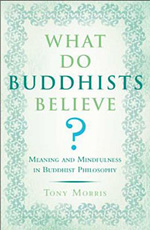"But let's go straight to the hard question, the one that gets invoked to justify every conflict. What would Buddhists have done to stop Hitler? Or Stalin, Saddam, or any number of tyrants from history? Isn't killing them the only way?
"A martial artist was once asked what he would do if a mad axe-man were charging towards him intent on attacking him. Would he try to reason with him, or run, or fight, or even kill his assailant in self-defense? The martial artist replied, 'I would try not to be there in the first place.'
"To the anti-appeaser this is a glib and annoying cop-out. But it is also a profound answer because it challenges us to take responsibility for our situation. Who got us into this mess in the first place? What are we doing here? Are we part of the problem or the solution? Perhaps killing or neutralizing one very nasty individual does change the world. But the capture of Saddam hasn't stopped the violence in Iraq.
"And what of the challenge posed by international terrorism as expressed in the recent atrocities? How do Buddhists respond?
"First, they argue that we must, all of us, as individuals and as an international community, use every means at our disposal to understand and remedy the deep causes which have led to the current state of affairs. Lasting solutions cannot be found until we truly grasp the reasons why suffering arises. This may involve facing some awkward facts. Funding Osama Bin Laden and selling chemical weapons to Saddam Hussein, for example, were not wise policies. If we are not hypocrites, we must take responsibility for our own part in fuelling terrorism.
"Second, we must respond to aggression without self-righteousness or hatred. We must engage in earnest and sincere dialogue with our perceived enemies, no matter how repugnant and misguided we feel their views to be. Only by demonstrating a better way forward and a more profound understanding of causation will we undermine their arguments. This is what it means to be truly strong.
"Third, violence always leads to more violence, thereby causing a cycle of retaliation, which makes the chances of lasting peace even more remote. We must work hard to unlink this chain. Like the Buddha, who was forever seeking to communicate his teachings in the most effective way so as to meet the precise needs of the enquirer, we must exhaust all the resources at our disposal, employing 'skilful means' (upaya) and above all utilizing the power of 'hearts and minds' to break the cycle.
"Finally, we must acknowledge that in any violent situation it is the weak, helpless, misguided, and innocent who tend to suffer most, whoever the aggressor and wherever the cause may be. The generals and politicians survive to fight another day. The poor and hapless die. It is too easy — and getting ever easier — to kill and to send one's own troops to their death from a safe distance.
"In the words of Daisaku Ikeda, 'Nothing is more barbarous than war, nothing more tragic.' Wars arise, in Buddhist terms, because a narrow, hardened and fundamentally deluded image of the 'Self' is projected outwards in such a way that all that is not 'me' or 'mine' is 'other', and to be regarded as alien and potentially threatening. The aim of Buddhist practice is to dissolve this sharp boundary-line until egocentric preoccupations subside and are replaced by a greater appreciation of the interconnectedness and interdependence of all beings.
"This is not to say that Buddhists have never been involved in wars. Some of the worst horrors of the twentieth century occurred in Southeast Asia. Buddhists have certainly engaged in military and nationalistic conflict, some even invoking religion as a justification. However, there is no explicit doctrine of a 'just war' in Buddhism, and those who advocate violent action do so in flagrant disregard of the key virtue of 'non-violence' (ahimsa) and the pacifist teachings of the scriptures. Nor is there any equivalent in Buddhist history to the blood shed in the name of the great monotheistic religions: no crusade, no inquisition and no holocaust."
